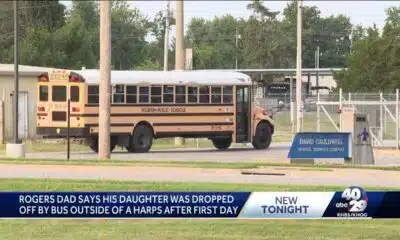News from the South - Georgia News Feed
Senate bill seeking to strip governmental immunity from ‘sanctuary cities’ passes committee • Georgia Recorder
Senate bill seeking to strip governmental immunity from ‘sanctuary cities’ passes committee
by Maya Homan, Georgia Recorder
February 5, 2025
Under what circumstances can a Georgia resident sue their local government for crimes committed by another person?
Under Senate Bill 21, which passed out of the chamber’s Public Safety Committee Wednesday, the answer may depend on the immigration status of the person in question.
The bill, sponsored by Vidalia Republican Sen. Blake Tillery, would build on a 2024 immigration bill known as House Bill 1105 that sought to punish local governments that failed to cooperate with U.S. Immigration and Customs Enforcement officials. Tillery’s bill would go even further, stripping local government agencies of their sovereign and governmental immunities from lawsuits in the event that an undocumented person commits a crime.
At the Senate Public Safety Committee hearing where the bill was discussed, Tillery argued that SB 21 would ensure that Georgia’s existing immigration laws are properly enforced.
“All that Senate Bill 21 says is if a local government or a local government official does not enforce Georgia immigration law, that they waive their sovereign immunity and are open to civil suit from anything that may fall from not following Georgia law,” he said.
However, skeptics of the bill pointed out that the new legislation could have wide-reaching consequences for members of law enforcement, educators and other government employees. The bill could also lead to an increase in legal action against local government agencies at a time when policies aimed at limiting lawsuits have been Georgia Gov. Brian Kemp’s top priority.
Mike Mitchell, who serves as deputy executive director of the Georgia Sheriffs’ Association, declined to endorse the bill, expressing doubts about the need for further legislation so soon after the passage of HB 1105. Last year’s measure took effect in May 2024, meaning that local law enforcement agencies have until May 2025 to enter into memorandums of understanding with federal law enforcement agencies.
“With House Bill 1105 last year, a lot of these mandates are already in place — in fact, they’re criminalized,” he said. “The sheriffs are already adhering to those standards, and they also have to report annually to the Department of Audits that they’re in compliance with those mandates.”
Senate Democrats also pushed back against the bill, arguing that it may open up public school employees to excessive lawsuits for failing to divulge their students’ immigration status to authorities.
“What I think I’m hearing you say is that if we were to pass this law as it is written, because our sanctuary laws are so broad, the teacher who chooses not to reveal to ICE that that child, or that child’s parents is undocumented, that could be considered having sanctuary for that child and therefore make them in violation of that law,” said Sen. Kim Jackson, a Stone Mountain Democrat.
Opponents of the bill, including the Council on American-Islamic Relations-Georgia Policy Director Megan Gordon, also raised concerns about how teachers and school administrators would navigate any conflicts that arise between state and federal law. Under a landmark 1982 U.S. Supreme Court decision, states cannot deny students access to public education based on their immigration status, which Gordon said would conflict with the wording of SB 21.
“These laws are mutually exclusive,” she said. “But also, the Supreme Court interpretation of the constitutional rights of children will trump state law every single time, which is something that I think this committee discounted.”
SB 21 passed in a 5-3 vote along party lines. It now goes to the Senate for a floor vote.
GET THE MORNING HEADLINES.
Georgia Recorder is part of States Newsroom, a nonprofit news network supported by grants and a coalition of donors as a 501c(3) public charity. Georgia Recorder maintains editorial independence. Contact Editor John McCosh for questions: info@georgiarecorder.com.
The post Senate bill seeking to strip governmental immunity from ‘sanctuary cities’ passes committee • Georgia Recorder appeared first on georgiarecorder.com
News from the South - Georgia News Feed
Blue Bell issues allergy alert for ice cream sold in 16 states
SUMMARY: Blue Bell Ice Cream is voluntarily recalling limited half-gallon Moo-llennium Crunch Ice Cream mistakenly packaged in Chocolate Chip Cookie Dough cartons at its Brenham, Texas plant. The packaging error omits allergen warnings for almonds, walnuts, and pecans, posing serious risks to allergic consumers. The mix-up was found on two half-gallons during restocking; no illnesses have been reported. Affected products have Moo-llennium Crunch lids with code 061027524 and Chocolate Chip Cookie Dough cartons. Distributed in multiple states including Texas and Alabama, consumers can return the product for a refund. For details, contact Blue Bell or visit retailers. The FDA is aware of the recall.
Read the full article
The post Blue Bell issues allergy alert for ice cream sold in 16 states appeared first on www.wsav.com
News from the South - Georgia News Feed
GOP Senate primary anyone’s game as candidates compete for votes and endorsements
by Ross Williams, Georgia Recorder
August 22, 2025
When Georgia Congressman Mike Collins kicked off his 2026 campaign for U.S. Senate this week, many in the crowd wore shirts emblazoned with stickers featuring his red, white and blue big rig-inspired logo.
More than a few at Tuesday’s rally also wore a rarer adornment: the glossy name tags worn by members of the Georgia Legislature.
Now weeks into the Jackson Republican’s plan to unseat Democratic U.S. Sen. Jon Ossoff, Collins’ campaign is touting endorsements from 40 GOP state senators and representatives.
That might not be surprising except for the presence of two other high-profile candidates in the Republican primary, including one with the backing of Republican Georgia Gov. Brian Kemp. The governor was in contact with President Donald Trump to discuss choosing a candidate they could both agree on, though Trump has yet to make an endorsement.
Former University of Tennessee football coach Derek Dooley, son of legendary University of Georgia football coach Vince Dooley, entered the race at the start of the month with Kemp’s backing, joining Collins and U.S. Rep. Buddy Carter.
Lawmakers at the Collins event expressed personal and political reasons for their support. Many know him personally or knew his father, the late former U.S. Rep. Mac Collins, who served in Congress from 1993 to 2005.
“This is probably easiest for me because I live five minutes from Mike,” said state Rep. Clint Crowe, a Republican from Jackson. “This is my hometown. I’ve grown up here. I went to high school with his sister. I go to church with him and his parents. I’ve been friends with the family for most of my life, and so I know Mike and I know who he is and I know where he comes from, so it’s a very easy decision for me to make to support him.”
Others cited the Laken Riley Act, which Collins sponsored and Trump signed into federal law. It expands the government’s power to detain non-citizens, including for nonviolent or property crimes. Riley was a 22-year-old student who was murdered last year at the University of Georgia campus in Collins’ district. A Venezuelan man who had entered the U.S. illegally was convicted of her killing and sentenced to life in prison without a chance for parole.
None of the legislators said they had faced pressure from Kemp’s office to support Dooley or not back Collins.
“I haven’t had anybody reach out from Mr. Dooley’s team or from the governor’s office, so I would hope that they would understand my position. If they don’t, my position is not going to change,” Crowe said.
Still a three-man race
Georgia Republican strategist Brian Robinson downplayed the significance of the legislator endorsements in the contest that is still more than eight months away.
Collins’ popularity under the Gold Dome speaks to his political skill and connections, but it’s still early, said Robinson, who is not working with any of the candidates in the race. Even popular politicians can find it difficult to transfer their political capital to another candidate, he said.
Still, Collins is in a good spot, at least at the moment, he added.
“I think Mike Collins is certainly in the pole position, you would have to assume,” Robinson said. “There was a poll out last week that showed him up slightly over Buddy and both about 20 points ahead of Derek Dooley.”
Carter has connections of his own and enough personal wealth to put up a fight, Robinson said, and he’s not counting Dooley out either, especially with the governor’s support — and his financial backing.
“They’re putting some resources into it and providing air cover while Derek builds out his operation, builds out his why for the campaign — why him — and as he fundraises and as he gets around the state to meet people. You can’t do everything at once, and having Kemp spend money on his behalf while he’s doing all that other stuff is hugely important.”
Emory University political science professor Andra Gillespie said Dooley’s “legendary” last name could offer a leg up, and she drew parallels to another recent Republican candidate with ties to football.
“I look at the Dooley candidacy as trying to do a better version of Herschel Walker, appeal to primary voters who might be drawn by the name and by their affinity for Georgia football – but hopefully somebody who, you know, has accounted for all of his children and doesn’t make weird comments on the campaign trail.”
Walker, a former UGA and NFL football legend, challenged Democratic U.S. Sen. Raphael Warnock in 2022 but fell short in a runoff after a campaign plagued with scandals including acknowledging children he had previously not talked about and allegations of pressuring women he had been in relationships with to get abortions.
During that primary, Trump was sore at the governor for not backing his false claims of election rigging in 2020. But with a few exceptions, Trump-backed candidates bombed in Georgia in the 2022 primaries.
The Trump effect
Trump’s endorsement may not have been enough for Walker to become a U.S. senator, but the Republicans vying for Ossoff’s seat are working hard to get the POTUS tap.
Carter went so far as to nominate Trump for the Nobel Peace Prize, but he’s not likely to get a senate nomination in return, Robinson said.
“Obviously we can assume that Trump is not interested in endorsing Buddy Carter by the fact that Buddy was already in the race when Kemp and Trump were in conversations, and Trump could have said then, ‘I’ll be with Buddy,’ but he didn’t.”
Trump has endorsed Lt. Gov. Burt Jones in his bid for the governor’s mansion, but he’s stayed mum on which Republican he thinks should be Georgia’s junior senator.
Gillespie said she expects Trump to keep quiet for the time being.
“What I suspect is Trump is going to sit this race out until it’s clear who Republicans want in the state, and then he will just ratify sort of like whoever the frontrunner is by endorsing them, because that’s how he tends to do it,” she said.
Robinson predicts Trump will eventually go with Collins, setting up a new “off again” phase in Trump and Kemp’s on-and-off again relationship.
“It would be my assumption that Trump will endorse Mike Collins at some juncture,” Robinson said. “And you’ll have this proxy war between Kemp and Trump to some degree, if that develops, because Kemp is openly supporting Derek Dooley. The Kemp people feel confident that the Kemp endorsement is influential just like the Trump endorsement is.”
YOU MAKE OUR WORK POSSIBLE.
Georgia Recorder is part of States Newsroom, a nonprofit news network supported by grants and a coalition of donors as a 501c(3) public charity. Georgia Recorder maintains editorial independence. Contact Editor Jill Nolin for questions: info@georgiarecorder.com.
The post GOP Senate primary anyone’s game as candidates compete for votes and endorsements appeared first on georgiarecorder.com
Note: The following A.I. based commentary is not part of the original article, reproduced above, but is offered in the hopes that it will promote greater media literacy and critical thinking, by making any potential bias more visible to the reader –Staff Editor.
Political Bias Rating: Center-Right
The content primarily focuses on Republican candidates and their campaigns in Georgia, highlighting endorsements, political strategies, and intra-party dynamics. It presents the information in a factual and balanced manner without overtly favoring or criticizing any candidate or party. The emphasis on Republican figures, conservative policies like the Laken Riley Act, and references to Donald Trump’s influence suggest a center-right perspective, but the neutral tone and inclusion of multiple viewpoints keep it from veering into partisan advocacy.
News from the South - Georgia News Feed
Local community facilitator bringing joy, beauty to nursing homes for National Senior Citizen Day
SUMMARY: On National Senior Citizen Day, August 21st, Wesley Thompson is launching a community project to bring joy to nursing home residents, starting at Pruitt Health in North Augusta where his mother resides. Beginning August 25th, volunteers will offer free haircuts and styling to brighten seniors’ days, addressing the lack of permanent hairstylists there. The initiative aims to expand to other facilities, encouraging community involvement through donations of time, meals, and handmade items like blankets. Wesley invites people to help by contacting him via Facebook, email (wesleyt83@yahoo.com), or phone (706-627-1939), emphasizing that collective effort can improve seniors’ lives.
Read the full article
The post Local community facilitator bringing joy, beauty to nursing homes for National Senior Citizen Day appeared first on www.wjbf.com
-
News from the South - Texas News Feed5 days ago
New Texas laws go into effect as school year starts
-
News from the South - Florida News Feed5 days ago
Floridians lose tens of millions to romance scams
-
News from the South - Kentucky News Feed6 days ago
AmeriCorps is under siege. What happens in the communities it serves?
-
News from the South - Florida News Feed6 days ago
Protesters go on strike in Israel demanding ceasefire and release of Gaza hostages
-
News from the South - Arkansas News Feed7 days ago
Rogers Public School bus drops student off at grocer store, father wants answers
-
News from the South - West Virginia News Feed4 days ago
Religious exemption debate front and center amid new school year in WV
-
News from the South - Missouri News Feed6 days ago
Three months since St. Louis tornado: How long will cleanup take?
-
News from the South - Georgia News Feed7 days ago
What do goats and Northfolk Sothern have in common? | FOX 5 News












































